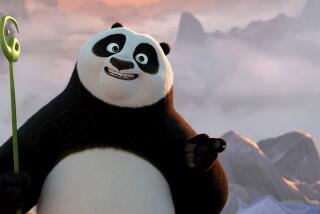Reel China: Targets an elusive film fan — the Chinese American
For years, Chinese films shown in U.S. theaters have fallen into two distinct camps, both driven by largely white patrons: martial-arts movies for young men, such as Jet Li’s “Hero,” or critically acclaimed art-house fare, such as Kaige Chen’s “Farewell My Concubine.” Only rarely has a movie conquered both blocs, as did Ang Lee’s “Crouching Tiger, Hidden Dragon.”
“The Butcher, the Chef and the Swordsman,” a Mandarin-language action comedy that hit U.S. screens this weekend, is a bit of a different animal — it has sword fights but also a music video, hand-drawn animation, slapstick jokes, split screens, black-and-white photography, opera, a video game and even a point-of-view shot from the eyes of a decapitated warrior. The movie’s distributor, China Lion, hopes the over-the-top mix will lure a new audience to cinemas: mainstream Chinese American film buffs.
More than 3.5 million people of Chinese descent live in the United States, according to 2007 data, and more than 1.3 million reside in Canada. But as film distributors have discovered, many Chinese movie fans simply don’t go to theaters here. They’re accustomed to watching films on specialty cable TV channels, over the Internet or on pirated DVDs — bootleg discs of the latest Chinese movies are often available in the United States within three days of their home country release.
L.A.-based China Lion and AMC Entertainment launched their exhibition partnership last fall, and their programming reflects not only the globalization of the entertainment industry but also the increasing sophistication and commercialization of China’s film business. The first three China Lion releases, though, have generated rather modest box-office returns.
October’s “Aftershock,” about a devastating 1976 earthquake, was one of the highest-grossing films ever in mainland China but brought in just $61,000 in limited North American release. In December, “If You Are the One 2” grossed a respectable $427,000, while the Chinese remake of “What Women Want” sold about $130,000 of tickets in February. The movies all premiered in about two dozen theaters.
Whereas those movies played in cities with large Chinese populations — San Francisco, Los Angeles, New York, Toronto, Seattle and Vancouver, Canada — “The Butcher, the Chef and the Swordsman” is also playing in markets with potential fan-boy business, including Boston, Chicago and Miami. In Southern California, AMC has booked the subtitled film into cities with large Asian populations such as Monterey Park and Arcadia, along with multiplexes in Santa Monica and Century City.
Robert J. Lenihan, the president of programming for AMC, the nation’s second-largest exhibitor, with about 6,000 screens, said the China Lion partnership is driven by AMC’s interest in “experimentation and different forms of content.” The chain recently formed a partnership with bloodydisgusting.com to release horror titles, and its AMC Independent brand exhibits film festival fare. “We have a history of doing this targeted release strategy,” Lenihan said.
Milt Barlow, a veteran distributor who formerly served as chief executive of Australia’s Village Roadshow, is running China Lion with Jiang Yanming, a veteran Chinese producer who founded Technicolor Beijing. Barlow said it will take a while to reintroduce the Chinese diaspora to moviegoing. To curb the chance of losing potential patrons to pirated DVDs, China Lion aims to release its annual slate of as many as 15 movies in North America the same day they premiere in China.
“Before, the only way the local Chinese audience could get these movies was through illegally pirated DVDs,” Barlow said. “Aftershock” grossed more than $100 million in China, but by the time China Lion was able to bring it to U.S. theaters three months later, bootleg videos were freely available. “It will take about two years to build the market — to have the local Chinese population learn that [moviegoing] is part of their social life,” Barlow said.
China Lion has the advantage of selective shopping. Some 450 movies were produced in mainland China in 2009, half of which are released in theaters there, and only a few are picked up by specialized American film distributors like Sony Pictures Classics. Nonetheless, overseas revenue of Chinese movies are surging, driven by attendance in Hong Kong, Taiwan and Southeast Asia — from $418.5 million in 2009 to an estimated $612.8 million in 2012, according to a study by EntGroup, a Chinese entertainment research and consulting service.
Although certain subjects and themes remain off-limits in Chinese movies because of government censorship — don’t look for a lot of sex or contemporary politics — the quality of the films is improving. But even if the films are getting better, Chinese productions rarely escape from the shadow of American movies. “The domestic market in China is big, but it’s not global,” Jiang said of the worldwide appeal of Chinese movies. “Hollywood movies dominate the whole world. But most Chinese movies are only distributed in China.”
“The Butcher, the Chef and the Swordsman” played at the Toronto International Film Festival last September and is the feature debut of filmmaker Wuershan (so cool he has just one name). The filmmaker, a painter and commercial director who studied at the Beijing Film Academy, recently struck a deal to make movies with Fox International Productions. The division of News Corp., which makes local-language movies in countries including Russia, China and India, co-financed “The Butcher, the Chef and the Swordsman.”
Divided into three chapters, the $1-million movie is chiefly focused on a revenge plot hatched by a master chef against a tyrant who bears more than a passing resemblance to Jabba the Hutt of “Star Wars.” The movie is jammed with disparate filmmaking techniques, and even though the story unfolds centuries ago, there are countless modern touches.
American producer and director Doug Liman, who made “Mr. and Mrs. Smith” and “The Bourne Identity,” met Wuershan in Beijing when the Chinese director was editing “The Butcher, the Chef and the Swordsman.” (They were introduced by Sanford Panitch, president of Fox International.) Liman promptly signed on as an executive producer, with the finished film bearing the imprimatur “Doug Liman Presents” — something he’s never done before.
“This is a guy who has his own voice,” Liman said of Wuershan. “His style of filmmaking screamed, ‘I’m my own person!’ He’s just a ball of creative energy.”
Although the movie is clearly aimed at Mandarin-speaking audiences, Liman hopes “The Butcher, the Chef and the Swordsman” can cross over to a broader population. “I had kind of a stuffy view of what a Chinese movie could look like,” Liman said. “But he single-handedly changed my attitude.”
More to Read
The biggest entertainment stories
Get our big stories about Hollywood, film, television, music, arts, culture and more right in your inbox as soon as they publish.
You may occasionally receive promotional content from the Los Angeles Times.







